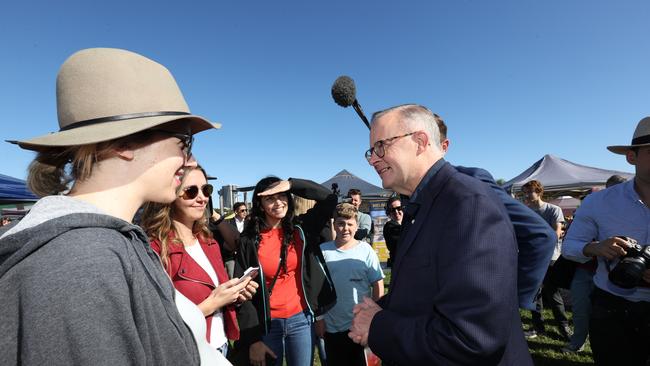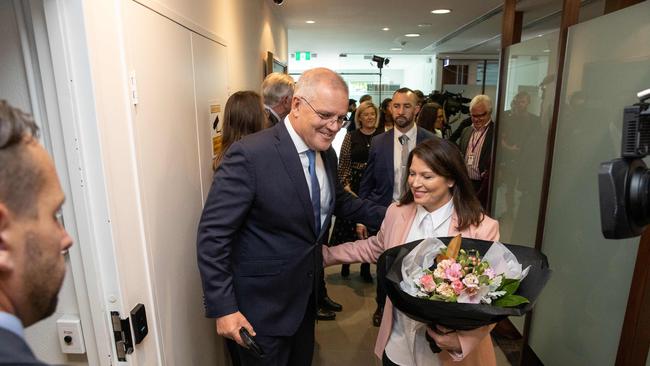Reserve Bank of Australia says real wages won’t increase until next year
Workers hoping for a pay boost will have to wait until next year with the Reserve Bank of Australia revealing a grim prediction.

Federal Election
Don't miss out on the headlines from Federal Election. Followed categories will be added to My News.
Aussies hopeful of a pay boost will have to wait until next year before real wages improve.
The Reserve Bank of Australia projects real wages will continue going backwards until December 2023. This means rises in the cost of living will continue to increase much more than wages.
The bank, which raised the cash rate for the first time since 2010 last week, predicted inflation would reach around 5.9 per cent by the end of this year, but wages would only increase 3 per cent in the same period.
This is not expected to turn around until December next year when inflation is expected to fall to around 3.1 per cent while wage growth is predicted to be slightly higher, at 3.5 per cent.
It comes as the federal Opposition has taken a swipe at Scott Morrison for failing to help families with cost-of-living expenses with Labor frontbencher Tanya Plibersek saying the PM had “completely given up”.
The Opposition’s education spokeswoman reiterated Labor’s promise it will do more to lift wages if it is elected to government to counter soaring inflation.
However, the Reserve Bank added the tight labour market and environment of higher inflation meant an increasing number of private-sector firms were paying higher wages and other benefits to attract and retain staff.
“While aggregate wage growth picked up during 2021, it was no higher than prior to the pandemic,” it said.
“However, the more recent evidence from liaison and business surveys is that larger wage increases have been occurring, or are planned, in many private-sector firms.”
According to Treasury budget papers published earlier last week, the price of what most households buy has increased 3.5 per cent during the last year, while wage growth only increased by 2.3 per cent.
This means that the real result is that wages have fallen by 1.2 per cent in the last 12 months.

However, Treasury expects the current labour market to change this going forward.
“The labour market has shown remarkable strength and resilience, with conditions bouncing back swiftly from the delta and omicron outbreaks,” Treasury documents read.
“The strength in the labour market is expected to continue to encourage participation as employment growth and higher wages draw people into the labour market, providing more labour supply in response to strong demand.”
The unemployment rate has also been revised due to the strength of the market.
It is now expected to fall from 4 per cent, to 3.75 by September 2022. This would make it the nation’s lowest level of unemployment in almost 50 years.
Treasury expects wages growth to outstrip inflation by 0.25 percentage points in 2022-23, 0.5 percentage points in 2023-24 and by 0.75 percentage points in 2024-25, driven by higher nominal wages growth and lower inflation. Inflation is expected to fall back to the top end of the Reserve Bank of Australia’s target band of 2 per cent to 3 per cent by next financial year.
There has been focus on @tanya_plibersek's relationship with Anthony Albanese. What does she think his strengths and weaknesses are? #Insiders#auspolpic.twitter.com/vzLfxXVXpC
— Insiders ABC (@InsidersABC) May 7, 2022
It comes as Labor frontbencher Tanya Plibersek accused Prime Minister Scott Morrison of having “completely given up” on supporting families struggling with cost-of-living pressures.
“Our plan to help with wages means helping business with their productivity,” Ms Plibersek told ABC’s Insiders program.
“So making sure we are investing in cheaper power, better NBN connections, bringing down the cost of doing business, investing in training and education so they have more skilled workers.
“So making sure we are investing in cheaper power, better NBN connections, bringing down the cost of doing business, investing in training and education so they have more skilled workers.”

According to new analysis from the Australian National University, almost two-thirds of the 3500 people polled said high living costs should be the number one priority of the next government – regardless of whether they were leaning towards vote for Labor, the Coalition or neither.
Study co-author Nicholas Biddle said voters wanted cost of living to be urgently addressed, so much so that it outranked all other policy considerations.
“Interestingly, we also found that this was a view held by people who said they would vote for Labor, for people who said they would vote for the Coalition, and for those who weren’t planning on voting for either party,” he said.
“For Coalition voters, 60.8 per cent said this was the highest priority. Among Labor voters it was even higher, with 68.8 per cent saying the same.”
Mr Morrison – who has built much of his re-election pitch based on the idea that his party is the better economic manager – said Australia’s rising cost-of-living pressures were less than what other countries were facing.
“The situation Australia faces is a situation faced all around the world,” he said earlier this week.
“Australians understand that.”
Originally published as Reserve Bank of Australia says real wages won’t increase until next year




